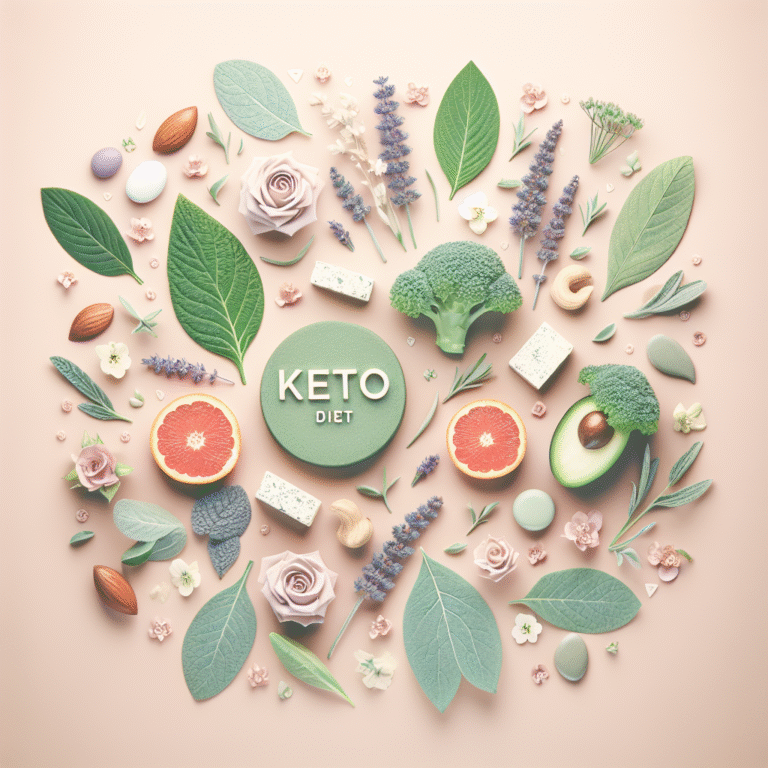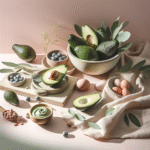The Best Anti-Bloat Foods Backed by Gut Health Science (2025 Edition)
Best anti-bloat foods for gut health. Picture this: You’ve just finished a delightful meal, your taste buds are singing praises, but moments later, you’re left feeling uncomfortable, heavy, and bloated. It’s a struggle many of us know far too well. Bloating can disrupt our daily lives, leaving us in discomfort and anxiety about our health. If this scenario sounds familiar, take solace in knowing you’re not alone—and there’s hope. Recent advances in gut health science have uncovered several foods that naturally help combat bloating, ensuring you can enjoy your meals without the ensuing discomfort.
Understanding Bloating: More Than Just a Feeling
Bloating is not just a feeling of fullness; it is a visible distention of the abdomen caused by excess gas or disturbances in the movement of the muscles of the digestive system. According to a study published by the National Institutes of Health (NIH), around 16-31% of the general population experiences bloating regularly. Thankfully, by introducing certain anti-bloat foods into your diet, it’s possible to mitigate these uncomfortable symptoms.
Top Anti-Bloat Foods and Their Benefits
1. Ginger: A Traditional Marvel
Ginger has been used for centuries as a natural digestive aid.
-
- It contains a compound called gingerol, which has anti-inflammatory and muscle-relaxant properties.
-
- A Harvard Health study points to ginger’s effectiveness in reducing bloating and gas.
2. Banana: The Potassium Powerhouse
Bananas help prevent water retention by regulating sodium levels in the body.
-
- Rich in potassium, bananas can control the bloating caused by excessively salty foods.
-
- The Mayo Clinic suggests bananas help restore a healthy fluid balance in the body, facilitating better digestion.
3. Papaya: An Enzyme-Rich Delight
Papaya contains an enzyme called papain that aids protein digestion.
-
- It promotes the breakdown of fibers, lessening the load on your gut.
-
- The NIH supports papaya’s role in easing gastrointestinal discomforts, including bloating.
4. Yogurt: Probiotic Goodness
Yogurt is loaded with probiotics that promote a healthy gut flora.
-
- Probiotics balance bacteria levels, reducing bloating and improving digestion.
-
- Research from the American Journal of Clinical Nutrition highlights that regular yogurt consumption effectively alleviates bloating symptoms.
5. Peppermint Tea: Calming Relief
Peppermint tea acts as a natural muscle relaxant.
-
- It soothes the digestive system, reducing spasms that cause bloating.
-
- According to a study by the University of Maryland Medical Center, peppermint oil considerably reduces IBS-related bloating.
6. Cucumber: The Hydration Hero
Cucumbers, primarily made up of water, help keep you hydrated and facilitate digestion.
-
- They contain quercetin, an antioxidant that reduces swelling.
-
- Cucumber’s high water content helps flush out excess liquids and toxins responsible for bloating.
Transformation Story: Sarah’s Journey to a Bloat-Free Life
Sarah used to feel like bloating was controlling her life. After trying every over-the-counter remedy without success, she decided to research natural solutions. By incorporating anti-bloat foods like yogurt and bananas into her daily diet, Sarah experienced significant improvement. Within three months, she noticed not only less bloating but also increased energy levels and improved mood. Sarah attributes her success to the power of mindful eating and the incredible benefits of these anti-bloat foods.
Comparison Table: Popular Foods and Their Anti-Bloat Effects
| Food | Key Ingredient | Anti-Bloat Benefit | ||
|---|---|---|---|---|
| Ginger | Gingerol | Reduces inflammation and gas | ||
| Banana | Potassium | Balances sodium and reduces water retention | ||
| Papaya | Papain | Aids in protein digestion | ||
| Yogurt | Probiotics | Balances gut bacteria | ||
| Peppermint | Menthol | Relaxes digestive muscles | ||
| Cucumber | Water | Flushes out excess fluids |
Mini FAQ: Common Bloating Concerns
- **Can anti-bloat foods be consumed daily?**
Yes, incorporating these foods into your daily diet can maintain a balanced digestive system.
- **How quickly can I expect results after changing my diet?**
Results vary, but many people notice improvements in bloating within days to a few weeks.
- **Are there any side effects to eating these foods?**
While generally safe, individual reactions vary. Consult a doctor if you experience adverse effects.
- **Do anti-bloat foods help with weight loss?**
While primarily for reducing bloating, they may indirectly aid weight management by improving digestion.
- **Is it necessary to avoid foods that cause bloating altogether?**
Moderation is key. It’s often more about balance than complete avoidance.
Take Action Now: Embrace a Bloat-Free Future
Imagine feeling light, comfortable, and at ease after every meal. By adopting a diet rich in anti-bloat foods, you can embrace this reality and enjoy life without the persistent discomfort of bloating. Start small by introducing one or two of these foods into your meals each week and experience the difference for yourself. Your journey to a bloat-free life begins today—don’t wait to feel your best self in 2025 and beyond!
The Best Anti-Bloat Foods Backed by Gut Health Science (2025 Edition)
Picture this: You’ve just finished a delightful meal, your taste buds are singing praises, but moments later, you’re left feeling uncomfortable, heavy, and bloated. It’s a struggle many of us know far too well. Bloating can disrupt our daily lives, leaving us in discomfort and anxiety about our health. If this scenario sounds familiar, take solace in knowing you’re not alone—and there’s hope. Recent advances in gut health science have uncovered several foods that naturally help combat bloating, ensuring you can enjoy your meals without the ensuing discomfort.
Understanding Bloating: More Than Just a Feeling
Bloating is not just a feeling of fullness; it is a visible distention of the abdomen caused by excess gas or disturbances in the movement of the muscles of the digestive system. According to a study published by the National Institutes of Health (NIH), around 16-31% of the general population experiences bloating regularly. Bloating can be particularly troublesome due to various factors, such as certain foods, stress, and gut health issues. Thankfully, by introducing certain anti-bloat foods into your diet, it’s possible to mitigate these uncomfortable symptoms.
Top Anti-Bloat Foods and Their Benefits
1. Ginger: A Traditional Marvel
Ginger has been used for centuries as a natural digestive aid.
-
- It contains a compound called gingerol, which has anti-inflammatory and muscle-relaxant properties.
-
- A Harvard Health study points to ginger’s effectiveness in reducing bloating and gas.
-
- Practical Tip: Start your day with a cup of ginger tea or add fresh ginger to your smoothies for an anti-bloat boost.
2. Banana: The Potassium Powerhouse
Bananas help prevent water retention by regulating sodium levels in the body.
-
- Rich in potassium, bananas can control the bloating caused by excessively salty foods.
-
- The Mayo Clinic suggests bananas help restore a healthy fluid balance in the body, facilitating better digestion.
-
- Practical Tip: Enjoy bananas as a mid-morning snack to curb cravings and keep bloating at bay.
3. Papaya: An Enzyme-Rich Delight
Papaya contains an enzyme called papain that aids protein digestion.
-
- It promotes the breakdown of fibers, lessening the load on your gut.
-
- The NIH supports papaya’s role in easing gastrointestinal discomforts, including bloating.
-
- Practical Tip: Include papaya in your breakfast bowl or combine it with yogurt and granola for a delicious anti-bloat treat.
4. Yogurt: Probiotic Goodness
Yogurt is loaded with probiotics that promote a healthy gut flora.
-
- Probiotics balance bacteria levels, reducing bloating and improving digestion.
-
- Research from the American Journal of Clinical Nutrition highlights that regular yogurt consumption effectively alleviates bloating symptoms.
-
- Practical Tip: Opt for plain, unsweetened yogurt with active cultures to maximize gut health benefits.
5. Peppermint Tea: Calming Relief
Peppermint tea acts as a natural muscle relaxant.
-
- It soothes the digestive system, reducing spasms that cause bloating.
-
- According to a study by the University of Maryland Medical Center, peppermint oil considerably reduces IBS-related bloating.
-
- Practical Tip: Enjoy a cup of peppermint tea after meals to promote digestion and ward off bloating.
6. Cucumber: The Hydration Hero
Cucumbers, primarily made up of water, help keep you hydrated and facilitate digestion.
-
- They contain quercetin, an antioxidant that reduces swelling.
-
- Cucumber’s high water content helps flush out excess liquids and toxins responsible for bloating.
-
- Practical Tip: Add cucumber slices to your water bottle for a refreshing and hydrating drink throughout the day.
Further Insights into Anti-Bloat Foods
Beyond the foods already discussed, several other nutrient-rich foods can help maintain gut health and reduce bloating. For instance:
-
- **Asparagus:** Known for its diuretic properties, asparagus can help flush out excess water and relieve bloating. It also boasts a high content of prebiotics, nourishing the beneficial bacteria in your gut.
-
- **Fennel Seeds:** Fennel seeds contain anethole, which may help relax the muscles in your GI tract, easing cramps and expelling gas, according to the NIH. Chew on fennel seeds after meals for best results.
-
- **




